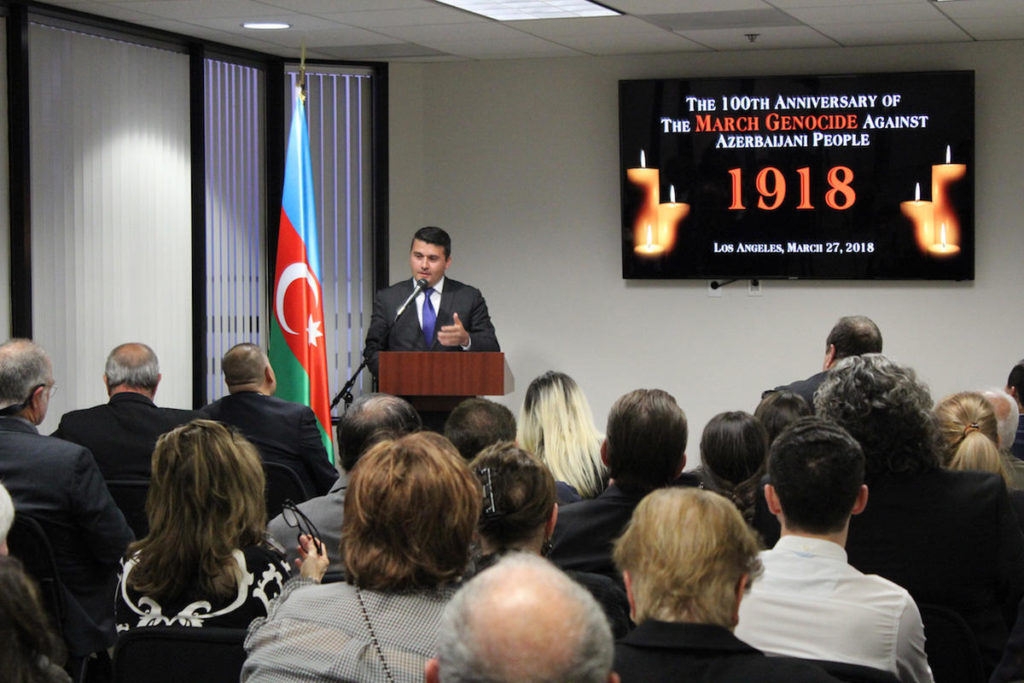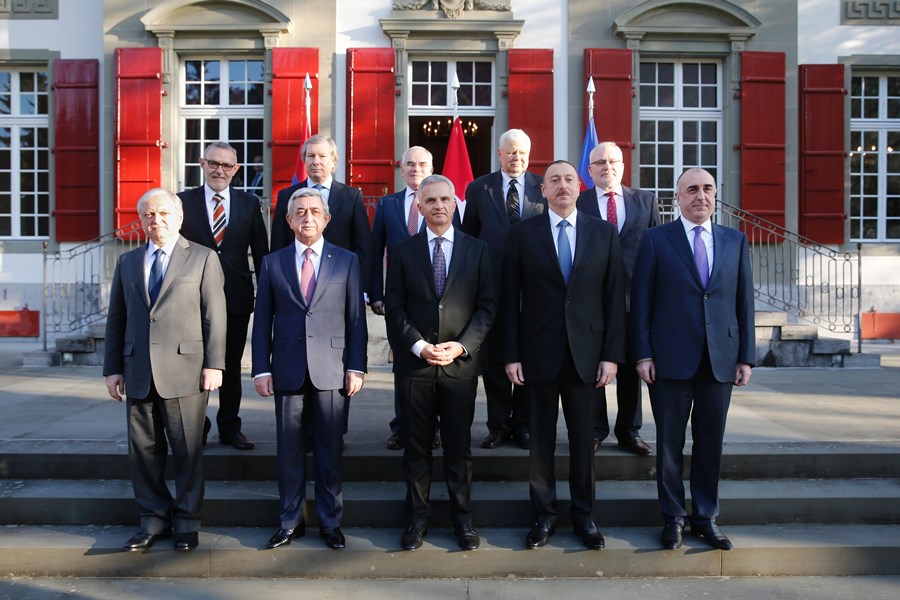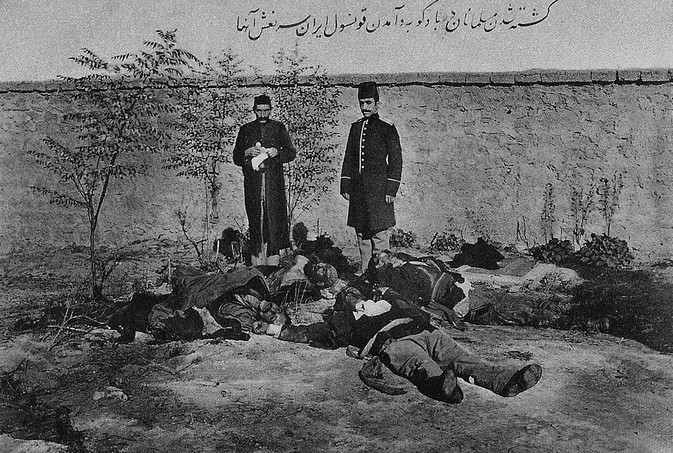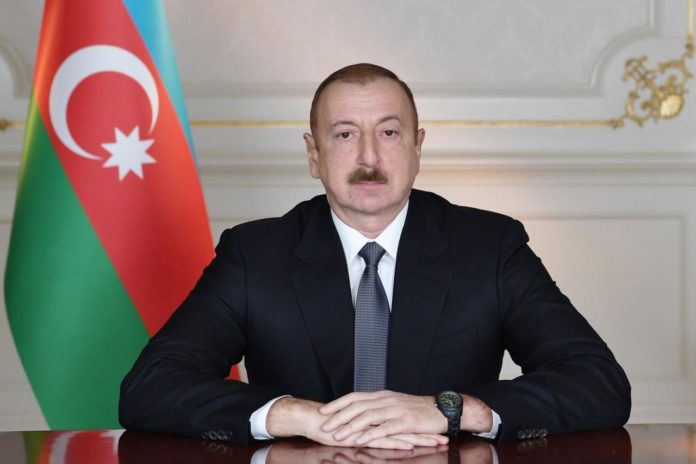To celebrate the 100th anniversary of the Azerbaijan Democratic Republic (ADR), the President of Azerbaijan H.E. Ilham Aliyev declared 2018 ‘Year of Azerbaijan Democratic Republic‘(ADR). Azerbaijan Democratic Republic has multidimensional phenomena which was achieved through continuous political struggle, nationalism and national harmony of Azerbaijanis in the 19th century. ADR was established on May 28, 1918, it being the first “parliamentary republic” in the entire Muslim world created after the First World War and the collapse of the Tsarist Russian Empire.
ADR was a great political, constitutional, social, moral and economical milestone in the national history of Azerbaijan, this was the first giant step towards achieving the desired goals of socio-economic prosperity and qualitative life. ADR has strategic importance and utility too. It changed its national, socio-economic, geopolitical and geostrategic history and created unshakeable national cohesion, societal harmony and political consensus which introduced a new model of governance in the country.
Establishment of ADR brought further politicization and democratization in the country wherein, concepts of equality, free will, and rights of common people and especially minorities were institutionalized. It facilitated process of greater socio-economic prosperity, economic liberalization and industrialization and tax reforms.
Rule of law, rise to commercial diplomacy and the last but not the least, ideas of diplomacy, dialogue and development were sustainably pursued which subsequently delivered dividends. Peaceful co-existence, interfaith harmony, empowerment of women and human survival were maintained through collectivism. ADR also guaranteed national sovereignty and territorial integrity. It promoted ideas of economic self-reliance, greater regional connectivity, and a stable political system in the country. It followed a balanced and development oriented foreign policy which enhanced its soft power image in the region and beyond which ultimately protected its national interests.
ADR has various important organs of the state and a functional Parliament was one of them. It was the first in the Muslim world to extend suffrage to women preceding the United Kingdom and the United States. Despite its short existence, ADR advocated and promoted the concepts of the rule of law, equality, personal liberties, multiculturalism, and secularism.
The formation of ADR contributed a remarkable role in the subsequent acceptance of the country in the international arena. The Parliament of the ADR institutionalized “Azerbaijani statehood” and especially the “Parliamentary Culture” even before a century which is indeed a great political mileage. It proved that “human engineering” held a diehard spirit which even the most brutal colonial regimes and repressions were not able to destroy the ideals of freedom and the traditions of state independence of the Azerbaijani people.
Now, an independent and strong Azerbaijan is a worthy successor of the Azerbaijan Democratic Republic (ADR). It promoted and adopted principles and traditions of secularism. Regardless of religion, nationality and political views all citizens of the newly proclaimed Republic had the same/ equal rights. Formation of the ADR was a historic event which declared and afterwards, applied true spirit of democracy, welfare state, humanity and above all ethnic diversification.
Somehow, it successfully combined European democratic values and the cultural heritage of the East in one political entity i.e. Azerbaijan Democratic Republic. It had western-style cabinet of ministers which ensured the full independence of the judiciary system and courts.
The ADR was a pioneer to witness a political and cultural leap of the Azerbaijani nation leading it along the path of freedom and progress. It developed the sovereign traditions of independent and modern Azerbaijan and laid down the foundations of a law-governed state, creating conditions for a strong and articulated civil society. It achieved great success in various fields of politics, economy, military construction and culture. The declaration of the Azerbaijani language as the Republic’s official language, establishment of Baku State University, formation of the national army and other security institutions and the emergence of an independent Azerbaijani political and economic line were some main achievements of the ADR.
Due to successful model of governance of the ADR, modern Azerbaijan today occupies a respectable position in the world community and in the family of civilized nations. H.E. Heydar Aliyev projected ADR as a model for a new state and society which united organically the democratic values of Europe and the traditional characteristics of oriental culture.
Right from the beginning the ADR had to face many serious problems but it managed to advocate the national interests and convinced the world community to support democratic principles and peaceful co-existence with all people and the states. Since its inception, the ADR government demonstrated its aspiration to be an integral part of the democratic world. The significant work of the ADR government left unforgettable traces in the history of Azerbaijan statehood and in the memory of the Azerbaijani people.
Established a century ago it played an important role in the recognition of modern Azerbaijan as a democratic republic among the countries of the world. The Azerbaijan Democratic Republic was the first successful attempt to establish a democratic and secular republic in the entire Muslim world. Geographically, it shared its borders with Russia in the north, Democratic Republic of Georgia in the north-west, Democratic Republic of Armenia in the west, and Persian Empire in the south. Ganja was the temporary capital of the Republic as Baku was under Bolshevik control. It established a government system in which a parliament elected on the basis of universal, free, and proportionate representation.
The role of the ADR in the history of the statehood and socio-political thought of people is unimaginable. All citizens of the Azerbaijan Democratic Republic, regardless of their ethnic and religious affiliation, were granted the right to vote. ADR granted equal rights to all its citizens irrespective of social status, gender and religion. Reformist discourse reached its apex with the creation of the ADR. Upon its foundation, universal women’s suffrage was adopted two years before adoption in the United States, and a decade before the United Kingdom.
It achieved great success in the spheres of national army building, issuing national currency, establishing a national bank, democratization, free elections, international relations and recognition of the independence of Azerbaijan by the international community. Furthermore, it secured the territorial integrity of Azerbaijan. It conducted diversified but integrated economic reforms which revolutionized its financial stability and socio-economic sustainability in the difficult times of weak economic conditions and financial shortcomings in the early days of the ADR.

ADR followed a balanced and pragmatic foreign policy which guaranteed its national sovereignty and territorial integrity in its early days. It tried to build friendly ties with the regional countries and its cooperative relations with Georgia was one of the main successes of its foreign policy. Both the countries agreed upon borders issues and the division of property with both creating a postal telegraph union and an agreement on tariffs and railroads. ADR and Georgia worked closely to promote greater cooperation in the Southern Caucasus despite Yerevan’s opposition.
Initially the ADR rigorously participated in the “Paris Peace Conference” in which it achieved a “De facto recognition” which paved the way to establish friendly and diplomatic ties with other European countries. A series of delegations were sent to many countries, especially Ottoman, European countries and the USA which ultimately brought dividends.
It adopted three golden principles of a peaceful foreign policy consisting of diplomacy, dialogue and development which benefited it, while negotiating with Iran and regional countries. An ADR delegation visited Tehran in March 1919, the two sides agreed to hold a conference beginning in December 1919 which resulted in an accord on trade.
During the first 18 months of its existence, the ADR initiated concrete steps to establish diplomatic ties of various degrees of closeness with Georgia, Iran and Turkey. It set up consulates in Tabriz and five other cities in Iran, in Batumi in Georgia, in Crimea in Ukraine, and in Ashgabat in Turkmenistan. And on April 22, 1920, the ADR parliament adopted a law on the creation of diplomatic missions in the major countries of Europe, the United States, and Soviet Russia, even though it had not yet reached accord with these states. Moreover, the parliament voted to replace the diplomatic mission to the Paris Peace Conference at Versailles with missions to the governments of the countries that had taken part in the talks.
Unfortunately, the ADR could not survive too long lasting only for 23 months and was attacked by the Red Army of Soviet Russia. Physically the existence of the ADR was no more but the “diehard spirit” of the ADR and its people that can never be diminished rather it laid down the guidelines of Azerbaijani statehood, nationalism, diplomacy, dialogue, development, conflict resolution, foreign policy, peaceful co-existence, respect for ethnic diversification and the last but not the least, commercial diplomacy which are still very much relevant and effective in today’s world of economic national protectionism, globalization, scarcity of resources and looming danger of unilateralism and modern Azerbaijan learnt lessons of survival and prosperity from it.
Establishment of Azerbaijan Democratic Republic in 1919 acted as a beacon of light for all Azerbaijanis which never left them in darkness rather always encouraged and motivated them to achieve the ultimate goal i.e. independence or freedom. Now all achievements in the fields of civility, politics, economics, development, national statehood, foreign policy and the last but not the least further, politicization and democratization are borrowed from the Azerbaijan Democratic Republic.
Existence of Azerbaijan Democratic Republic was a first giant step towards the realization of long awaited dreams of socio-economic prosperity, strengthening of national pride, protection of sovereignty and strong defense which is now reflected in the immense achievements of modern Republic of Azerbaijan which possess more than 75 percent of GDP of the South Caucasus.
Azerbaijan has now become connecting hub in the region which connects people, ideas, resources, minds, infrastructures and above all humanities which is the resultant/ apex of the Azerbaijan Democratic Republic.
ADR’s Declaration of Independence
ADR declared and adopted “Declaration of Independence“ which reflected its strong political commitment towards democracy, secularism and parliamentary culture. In 1918, the Parliament was elected on the basis of universal, free, and proportionate representation, to which the Cabinet of Ministers was held responsible. The Members of Parliament were elected from all groups living within Azerbaijani society, regardless of creed or ethnic origin, including Armenians, Russians, Poles, Jews and Germans.
Like any modern democratic state of the today world, ADR’s state power comprised of a parliament, government and independent judiciary which created a strategic equilibrium among the different organs of the state which is the essence of modern and advanced democratic Azerbaijan and the world alike.
Ethnic diversity and respect of different nationalities was the real strength and point of unity of the ADR. There was an incomparable degree of religious tolerance, with synagogues, Orthodox and Catholic churches being found alongside mosques which maintained a unique concept of humanity, universality and even globalization.
ADR tried to follow business oriented policies and governance like “Japanese Model” and included trade unions, businessmen and economic leaders in the parliament and provided 3 seats to Baku trade unions and 2 seats to Baku Oil Producers Union. Executive authorities represented by the government reported to the legislature parliament. The state was governed on the basis of laws and regulations adopted by the parliament.
Formation of ADR marginalized political divide among the different political parties and actors of that period and promoted nationalism. There was no compromise on political stability. There was no political mileage expect to secure the system. There was no political maneuvering but to achieve continuation of the system. There was no “worship” for a specific personality but to maintain dynamics of the system. The parliament officially opened on 7 December 1918 and operated for 17 months, during which it reportedly held 145 meetings and discussed more than 270 bills, of which 230 were adopted.

ADR’s Foreign Policy
ADR initiated many short and long terms policies/programs/optics to secure its sovereignty and territorial integrity. The survival of ADR totally rested on its societal unity, economic viability, political stability and strong defense in case of any internal or external aggression/ attack. To minimize the chances of any misadventure from the regional countries, ADR followed zero interference in the affairs of other countries. The ADR also adopted peaceful foreign policy to resolve all the conflicts.
ADR had strategic priorities in its foreign policy. The restoration of the independence was perhaps one of the greatest achievements in the history of the modern Azerbaijan. The Azerbaijan Democratic Republic intended to establish friendly relations with all nations, especially with the neighbouring nations and states. So its foreign policy was the ideal combination of regionalism and internationalism. The main aim of the foreign policy of the Azerbaijan Democratic Republic was to promote newly established state. The new government, therefore, conducted an active foreign policy from its inception. Information was sent to a number of European countries about the establishment of the new state. The government signed a friendship treaty with the Ottoman Empire in Batumi.
Alimardan bey Topchubashov was sent to Istanbul to create diplomatic relations with European countries. With better skills and determination having clarity of purpose the ADR slowly but gradually gained sympathy, support and recognition within the region and beyond which was considered to be its one of the main achievements of its foreign policy.
With the passage of time ADR got familiarized among the European countries and succeeded to clinch vital support on different issues of economic productivity, national survival and greater connectivity. Especially central powers i.e. Germany, Austria-Hungary, the Ottoman Empire, and Bulgaria were starting giving importance to ADR. Moreover, rigorous participation in the “Paris Peace Conference” was the turning point in its foreign policy. The Azerbaijan issue was discussed at the Council of Allied Powers on 2 May 1919 for the first time. On 23 May 1919 a member of the British delegation, L. Mallet, met Topchubashov and they discussed political, military and economic issues. On 28 May Topchubashov met a member of the US delegation, Henry Morgenthau, during the first half of the day and President Woodrow Wilson during the second half.
The Azerbaijani parliament adopted a law on the establishment of diplomatic missions in the United Kingdom, France, Italy, the United States, Switzerland, Poland, Germany and Russia. Representative offices of the UK, Greece, Belgium, Georgia, Armenia, Denmark, Italy, Lithuania, Poland, Iran, USA, Ukraine, Finland, Sweden, Italy and Switzerland were opened in Baku.
The main purpose of the ADR delegation to Paris Peace Conference was to achieve worldwide recognition and unconditional independence of Azerbaijan Democratic Republic as a sovereign state. Due to rigorous efforts of the ADR’s delegation, the ADR was de facto recognized by the international community. In the history of Azerbaijani diplomacy ADR de facto recognition was important, in addition, in 1919, the ADR established ministry foreign affairs, and the day of its creation July 9, 1919 is now celebrated as the Day of the Diplomatic Worker.
ADR considered socio-economic development important for its survival and sustainability. For the first time it institutionalized the concepts of property pluralism, national bank, national currency, state budget, national market, foreign economic relations and economic management. It had flexible tax system which was instrumented to create business and investment environment in the country.
Property relations, agrarian issues, financial and monetary policy, foreign trade, economic relations, economic management system and tax practice were included in national economic model of Azerbaijan Democratic Republic. The ADR’s economic system was based on principles of “economic independence”, equality, productivity, optimal utility of available resources and the last but not the least, development of human capital which inspired/motivated its rulers, decision makers and people to form a viable democratic society having social justice and equality among citizens and political parties alike.
Genocide against Azerbaijan
Unfortunately, the Republic of Azerbaijan faced severe genocide in the last two centuries which was indeed heartbreaking. This genocide was a crime against humanity and humans/ Azerbaijanis, it was an act of state terrorism and ethnic cleansing. The Khojaly genocide was inconceivably cruel when inhuman methods was resorted to by the Armenians who violated the rights of Azerbaijani people, created obstacles to get the education in native language and exerted strong pressure upon them. The historical names of Azerbaijani villages were changed.
The purpose of genocide, ethnic cleansing and deportation policy of the Armenian nationalists and their supporters lasted over two centuries who banished them from their historical native lands, establishing Great Armenia” state on those territories. The Azerbaijani population was repeatedly subjected to the gross human rights violations and inhuman and degrading treatment by Armenian nationalists (in 1905-1907, 1918-1920, 1948-1953, 1988-1993). The most horrible of such tragedies against the Azerbaijanis is the genocide committed 100 years ago, on March 31, 1918, and it differs for its brutal atrocities. Since March of 1918 thousands of Azerbaijani civilians have been killed on grounds of their nationality, people were burned alive, rare historical monuments, schools, hospitals, mosques were destroyed.
The Khojaly genocide was the tragedy of the 20th century, it was a result of Armenian aggressive and criminal policy. The Khojaly genocide was one of the most terrible and tragic pages of Azerbaijan history. It was one of the most serious crimes not only against the people of Azerbaijan, but humanity as a whole. The Khojaly genocide is comparable to the genocides in Khatin, Hiroshima, Nagasaki and Songmi.
Khojaly reflected the history and traditions of Azerbaijan since the ancient times. Its culture is classified as Khojaly-Gadabay in the Azerbaijani history. Cromlechs, dolmens, Cyclops, tumulus’s of Khojaly, as well as different housing wares are the patterns of material culture that reflect the dynamics of social development. The destruction of all these material culture monuments and Khojaly graveyard, one of the most ancient cemeteries in history after the Armenian occupation, are obvious examples of Armenian barbarism and aggression against the world culture.
Armenian military forces committed genocide in the town of Khojaly with a population of 7 thousand people on February 26 1992. There were 3 thousand people in the town at the time of Armenian military forces’ attack. 613 people were killed, 1000 people of different ages became invalid during Khojaly genocide. 106 women, 63 children, 70 old men were killed. 8 families were completely annihilated, 130 children lost one parents, while 25 both of them. 1275 peaceful residents were taken hostage, the fate of 150 is still unknown.
Azerbaijan was a victim of planned ethnic cleansing by Armenian for 200 years. The people of Azerbaijan were deported from their historical lands and became refugees and internally displaced persons (IDPs) because of Armenian illegal occupation. Azerbaijanis were also forced from their historical lands during the Soviet period. 150,000 Azerbaijanis were deported from Armenia and placed in the Kur-Araz plain from 1948-1953. 250,000 Azerbaijanis were forced from their historical territories in 1988 and Armenia became a mono-ethnical state. The Daghlig Garabagh events which started in 1988 along with continuous efforts to implement the Armenian desire of building a state from sea to sea, led to the destruction of towns and villages, murder of thousands of innocent people, as well as the exile of hundreds of thousands of Azerbaijanis from their native lands.
To achieve dreams of greater Armenian its nationalists expanded their illegal activities in the early 20th century. It was coined by the Dashnaktsutyun Party which systematically expelled Azerbaijanis from their historical lands and native homes and embarked on a policy of ethnic cleansing and genocide. For example, in 1905-1906 the Armenians committed massacres against Azerbaijani civilians in Baku, Ganja, Karabakh, Irevan, Nakhchivan, Ordubad, Sharur-Daralayaz, Tiflis, Zangezur, Gazakh and other places, perpetrated ruthless massacres against the local population, burned and destroyed cities and villages. Armenian armed forces destroyed more than 200 Azerbaijani villages in Shusha, Zangezur and Jabrayil region, Irevan and Ganja provinces, expelling tens of thousands of Azerbaijanis from their homes.

Human bloods were everywhere as the beasts searched for Azerbaijanis and soon, the bloody events spread out covering the entire territory of Azerbaijan. In March-April 1918, about 8,000 civilians were slaughtered in Shamakhi. Armenian gangs stormed the city, setting houses on fire and those trying to escape from the fire were shot. The majority of Muslim monuments of culture, including the Friday Mosque of Shamakhi were set on fire and burnt to the ground with elderly, women and children hiding in it. People were buried alive, while some were brutally tortured before being killed.
Moreover, Armenian nationalists killed with utmost cruelty more than 16,000 people in Guba province in the first five months of 1918. The facts of mass extermination of the Azerbaijanis of Guba by Armenian-Dashnak gangs were proven again in the 21st century with the discovery in 2007 of mass graves in Guba, this is a fact confirming Armenian brutality. The study of the burial site revealed that people were subjected to unprecedented violence and killed with cruelty during the Armenian armed attack on Guba in 1918.
Ruthless massacre of Azerbaijanis was also carried out in Shusha, Irevan, Zangezur, Karabakh, Nakhchivan, Kars and other regions. When committing these atrocities, the Armenians burned schools and mosques and destroyed samples of material culture of Azerbaijanis.
After the proclamation of the Azerbaijani Democratic Republic on May 28, 1918, the newborn government investigated the March events. In 1919-1920, the ADR commemorated March 31 as the national day of mourning. Later, during the presidency of Heydar Aliyev in Azerbaijan, the March 31 events were officially recognized as the Day of Genocide of Azerbaijanis, according to the presidential decree in 1998.
A century ago Armenian terrorists committed atrocities of such brutality and viciousness that words cannot fully describe them. These violent and inhuman actions should never be forgotten and can never be justified. The world community has to remember and keep the memory of the genocide of 1918 alive.
The massacres committed in Baku gained mass scale on March 31 and on April 1-2, 1918 when innocent civilians were killed mercilessly. During that genocide, 30, 000 persons in Baku and in surrounding villages were brutally murdered on the ground of nationality. At the international level this genocide has not been yet given legal assessment.
Azerbaijanis strongly condemn the deliberate and continued policy of genocide, crimes against humanity, racial discrimination and ethnic cleansing by Armenia against the people of Azerbaijan and reiterate the importance of ceasing impunity of Armenia to prevent occurrence of such inhumane crimes.
Genocide is a crimes against humanity which must be condemned. Reasons of genocides especially Turk Muslim population and Azerbaijan in the 20th century must be studied in a larger context. Being an independent country, Azerbaijan must know the main reasons and motives of genocides against them. Although unlimited sacrifices of Azerbaijanis stood against all kinds of crimes against them but still Azerbaijan people must know the “art of prevention” and “early warning system” to safe guard its population from this kind of human crisis in the future. Investment in education, knowledge, humanity, social development, infrastructural development, self-reliance of economy, strong defense and strong political leadership are some of the remedial means to get free from genocides. Political connectivity, formation of strategic alliances with regional as well as international power brokers and development of a strong military may also be useful to counter such ill designs of any country against Azerbaijan.
Huma blood is sacred and whosoever kills in the path of “right”, “virtue”, “noble cause” and above all struggle for independence is a “martyr”. The national and ancient history of Azerbaijan is full of these unsung martyrs who laid down their lives for the dignity and honor of their country. The formation of Azerbaijan Democratic Republic reflected unlimited human sacrifices, political struggles, social strengths and national services of its common people and leaders alike.




